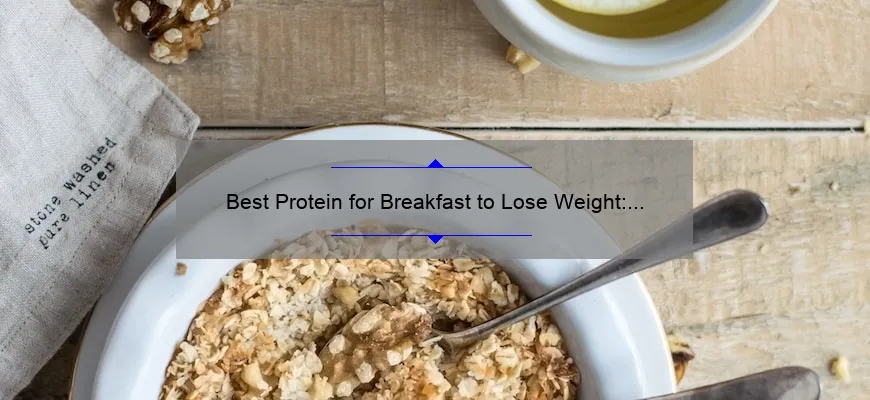Short answer best protein for breakfast to lose weight:
Consuming high-quality protein sources like eggs, Greek yogurt, cottage cheese, or protein shakes can promote weight loss by boosting metabolism, reducing appetite, and increasing feelings of fullness throughout the day.
The Benefits of Including Protein in Your Breakfast for Weight Loss
When it comes to weight loss, we often focus on what foods to cut out of our diet. However, one crucial aspect that is often overlooked is the importance of including protein in our breakfast. Protein is not only essential for building and repairing muscles but can also be a powerful ally in shedding those extra pounds.
So, why should you make sure your morning meal includes a good dose of protein? Let’s dive into the benefits:
1. Sustained Energy: Protein takes longer to digest than carbohydrates or fats, meaning it can provide a longer-lasting source of energy throughout the day. By starting your day with a protein-packed breakfast, you’ll feel fuller for longer and avoid those mid-morning snack cravings.
2. Increased Metabolism: Including protein in your breakfast can kickstart your metabolism and keep it elevated throughout the day. This thermic effect of food (TEF) refers to the energy required by our bodies to digest and process different nutrients. Protein has a higher TEF compared to fats or carbs, meaning you’ll burn more calories just by eating it!
3. Muscle Maintenance: When aiming to lose weight, we want to shed excess fat while retaining muscle mass. A high-protein breakfast provides the amino acids necessary for muscle synthesis and repair. Preserving lean muscle tissue is crucial as it helps maintain an active metabolism and promotes overall strength and vitality.
4. Appetite Control: Protein has been proven to increase satiety levels, helping us feel satisfied after a meal for an extended period. By reducing hunger pangs or mindless snacking later in the day, including protein-rich foods in your breakfast routine can contribute significantly to weight loss efforts.
5. Blood Sugar Regulation: Carbohydrate-heavy breakfasts lead to rapid spikes in blood sugar levels followed by crashes that leave us feeling sluggish and craving more unhealthy snacks throughout the day. Adding protein into your morning meal helps stabilize blood sugar levels, keeping you focused, energized, and in control of your food choices.
Now that we’ve explored the benefits of including protein in our breakfast for weight loss let’s get creative with some delicious options. How about starting your day with a veggie omelet filled with spinach, tomatoes, and a sprinkle of feta cheese? Or perhaps you prefer a Greek yogurt parfait topped with fresh berries and a handful of nuts for that extra protein boost.
Remember, the key is to choose high-quality proteins such as eggs, Greek yogurt, lean meats, legumes, or plant-based alternatives like tofu. So next time you reach for a quick sugary cereal or carb-loaded toast, think twice and give your body the fuel it needs by incorporating protein into your morning routine. Your waistline will thank you!
Choosing the Right Protein for a Healthy and Satisfying Breakfast
Breakfast is often touted as the most important meal of the day, and for good reason. It kick-starts our metabolism, provides us with the necessary energy to tackle the day ahead, and sets the tone for healthy eating throughout the day. When it comes to crafting a nutritious breakfast, one component that should not be overlooked is protein. But with so many options available, how do we choose the right protein for a healthy and satisfying start to our mornings? Read on to find out.
Firstly, let’s talk about why protein is important in breakfast. Protein plays a crucial role in repairing tissues, supporting immune function, building muscle mass, and keeping us feeling fuller for longer periods of time. Incorporating a good source of protein into your breakfast can help regulate your appetite and prevent those mid-morning hunger pangs.
When selecting a protein option for your morning meal, it’s essential to consider its nutritional value and biological quality. High-quality proteins contain all essential amino acids required by our bodies for optimal functioning. Sources such as eggs, Greek yogurt, cottage cheese, or whey protein powder are excellent choices due to their complete amino acid profiles.
Eggs have long been hailed as a nutritional powerhouse when it comes to protein. Not only are they rich in amino acids but also packed with essential nutrients like vitamin D and choline. Whether you prefer them scrambled or boiled, incorporating eggs into your breakfast routine guarantees a solid dose of high-quality protein.
Greek yogurt has gained popularity in recent years due to its creamy texture and high protein content. Loaded with probiotics that promote gut health and calcium for strong bones, Greek yogurt makes an ideal base for delicious breakfast parfaits topped with fresh fruits and nuts.
Cottage cheese may not be everyone’s first choice when it comes to breakfast proteins but hear us out! It boasts an impressive 25 grams of protein per cup while also offering calcium and vitamin B12. Combine it with some juicy berries or a drizzle of honey for a sweet and savory twist to start your day on the right foot.
If you’re always on the go or simply prefer a quick and easy protein option, consider incorporating whey protein powder into your morning routine. Packed with essential amino acids, this versatile powder can be added to smoothies, oatmeal, or even used as a substitute for flour in pancake recipes.
Now that we’ve covered some excellent protein options for breakfast, let’s talk about portion sizes. While protein is undoubtedly beneficial for our health, moderation is key. Aim to include around 20-30 grams of protein in your breakfast to ensure an optimal nutrient balance without overwhelming your body. Remember – too much of a good thing can sometimes be counterproductive!
In conclusion, choosing the right protein for a healthy and satisfying breakfast doesn’t have to be daunting. Whether you opt for eggs, Greek yogurt, cottage cheese, or whey protein powder – rest assured that you’ll be fueling your body with essential nutrients and kick-starting your day on the right note. So next time you find yourself contemplating what to have for breakfast, remember these tips and savor every moment of nourishing deliciousness!
Step-by-Step Guide: Incorporating the Best Protein into Your Morning Routine for Effective Weight Loss
In today’s fast-paced world, finding effective ways to shed those extra pounds and maintain a healthy weight can often feel like an uphill battle. Fortunately, there is a simple yet powerful tool that can help you achieve your weight loss goals – protein. Incorporating the best protein into your morning routine is not only a delicious way to start your day but can also enhance your weight loss journey. In this step-by-step guide, we will walk you through the process of making protein a key component of your mornings for effective weight loss.
Step 1: Understanding the Power of Protein
Before we dive into incorporating protein into your morning routine, let’s first understand why it plays such a crucial role in promoting weight loss. Protein has the unique ability to increase feelings of fullness and reduce hunger, which helps control calorie intake throughout the day. Moreover, it boosts metabolism by requiring more energy to digest compared to fats or carbohydrates. This thermogenic effect contributes to additional calorie burn and facilitates weight loss.
Step 2: Choose Your Best Protein Source
Not all proteins are created equal when it comes to effective weight loss. It is important to select high-quality sources that provide essential amino acids without unwanted additives or excessive fat content. Some excellent options include Greek yogurt, eggs, lean meats (such as chicken or turkey), tofu, and protein-rich plant-based alternatives like quinoa or lentils. Remember to opt for organic and hormone-free options whenever possible for optimal health benefits.
Step 3: Plan Ahead for Convenience
Mornings can be chaotic, so planning ahead is key for successfully incorporating protein into your routine. Invest in meal prep containers and plan your breakfasts in advance; this will save you time and ensure you have nutritious meals readily available during busy mornings. Prepare overnight oats with added chia seeds or mix up a batch of egg muffins with vegetables and lean proteins that can be easily reheated.
Step 4: Get Creative with Breakfast Recipes
The key to sustaining a protein-rich morning routine is variety. Don’t limit yourself to boring and repetitive meals; instead, experiment with different recipes that incorporate your chosen protein source. Mix Greek yogurt with fresh fruits and a sprinkle of granola for a delicious breakfast parfait or whip up an omelet loaded with veggies and lean meats. Get creative and have fun in the kitchen – the possibilities are endless!
Step 5: Supplement Smartly
Sometimes, achieving the right amount of protein solely through food sources may be challenging or time-consuming. In such scenarios, it may be beneficial to supplement your diet with high-quality protein powders or shakes. These can serve as a convenient alternative during rushed mornings or when you’re on-the-go. However, ensure you choose reputable brands that offer clean ingredients without added sugars or artificial sweeteners.
Step 6: Monitor Your Progress
Lastly, keep track of your progress along the way to stay motivated and determine if any adjustments are needed. Take note of how adding protein to your morning routine affects your hunger levels, energy levels throughout the day, and weight loss progress. Consulting a registered dietitian or nutritionist can provide valuable guidance in understanding how protein intake aligns with your specific goals.
Incorporating the best protein into your morning routine doesn’t have to be a daunting task on your weight loss journey. By following these steps and making intentional choices about what you consume each morning, you can maximize your chances of success while enjoying tasty and satisfying breakfasts every day. Remember, a well-rounded approach encompassing regular exercise alongside balanced meals is essential for achieving sustainable weight loss results. So start incorporating that protein power into your mornings today!
Frequently Asked Questions about Best Protein Choices for Breakfast and Weight Loss
Frequently Asked Questions about Best Protein Choices for Breakfast and Weight Loss
When it comes to maintaining a healthy weight or shedding a few pounds, breakfast is often considered the most important meal of the day. And if you’re looking to incorporate protein-rich foods into your morning routine, you’re on the right track! Protein plays a crucial role in weight loss by boosting metabolism, reducing appetite, and building lean muscle mass. However, navigating through countless options can be overwhelming. That’s why we’ve compiled this list of frequently asked questions about the best protein choices for breakfast and weight loss.
1. What are the Benefits of Protein in Breakfast?
Protein offers numerous benefits when consumed as part of your breakfast routine. Firstly, it helps regulate your hunger hormones, extending feelings of fullness and curbing those mid-morning snack cravings. By adding protein to your morning meal, you’ll also experience improved blood sugar control throughout the day, which contributes to stable energy levels and reduced risk of overeating later on.
2. How Much Protein Should I Aim for at Breakfast?
To maximize its benefits, aim for around 15-30 grams of protein during breakfast. This amount has been shown to optimize muscle synthesis, support satiety, and contribute to overall weight management. Whether you prefer animal-based proteins like eggs or plant-based options like Greek yogurt or tofu scramble – ensuring an appropriate protein intake will set you up for success throughout the day.
3. Are There Any Specific Protein-Rich Foods Suitable for Breakfast?
Absolutely! There’s no shortage of delicious and nutritious protein-packed options tailored specifically for breakfast enthusiasts:
a) Eggs: A classic choice that delivers high-quality protein with essential amino acids while providing necessary vitamins and minerals.
b) Greek Yogurt: Creamy and versatile, Greek yogurt boasts twice the protein content compared to regular yogurt varieties—perfect for pairing with fruits or granola toppings.
c) Chia Seeds: These tiny powerhouses are packed with protein and fiber, adding a nutritious boost to smoothies, overnight oats, or chia pudding.
d) Quinoa: This ancient grain offers a complete protein profile, making it an excellent choice for breakfast porridges, savory bowls, or even as a substitute for oatmeal.
e) Cottage Cheese: A lesser-known contender for breakfast protein sources, cottage cheese is rich in casein protein and pairs well with fruits or whole-grain toast.
4. Can Protein Shakes be a Good Breakfast Option?
Protein shakes can certainly be part of your morning routine if you’re looking for convenience and quick nutrient delivery. Opt for high-quality protein powders without added sugars or artificial sweeteners. Combine them with milk (dairy or plant-based), fruits, vegetables, or nut butter to create a balanced meal replacement shake.
5. What Are Some Creative Ways to Incorporate Protein into Typical Breakfast Foods?
To spice up your morning meals while boosting the protein content, here are some creative ideas:
a) Include sliced hard-boiled eggs on avocado toast – a trendy option that marries healthy fats and protein deliciously.
b) Make an omelet loaded with spinach, mushrooms, and feta cheese – perfect for those seeking a tasty veggie-packed option.
c) Whip up protein pancakes using flour alternatives like almond flour or chickpea flour and top them off with Greek yogurt instead of syrup.
d) Prepare homemade granola bars packed with seeds like pumpkin seeds or hemp hearts for extra crunch and protein throughout the day.
In conclusion, incorporating the right proteins into your breakfast routine can play an essential role in achieving weight loss goals. By choosing options such as eggs, Greek yogurt, chia seeds, quinoa, or cottage cheese – whether in their natural form or creatively combined – you’ll start each day on the right nutritional track. Remember to experiment with different flavors and recipes to keep your breakfasts exciting, while ensuring you’re fueling your body for success.
How Your Choice of Breakfast Protein Impacts Your Weight Loss Journey
When embarking on a weight loss journey, the importance of a well-balanced breakfast cannot be overstated. And while we often focus on carbs and grains to fuel our mornings, the choice of protein can make all the difference in achieving our weight loss goals. In this article, we’ll delve into why your choice of breakfast protein impacts your weight loss journey and provide you with some clever and witty insights along the way.
Firstly, let’s talk about satiety – that feeling of fullness after a meal. Protein has been found to be more satiating than carbohydrates or fats, meaning it keeps us satisfied for longer periods. So when you opt for a protein-rich breakfast, you’re less likely to experience those mid-morning hunger pangs that lead to unhealthy snacking or overeating later in the day.
But not all proteins are created equal! It’s crucial to choose the right kind of protein for your morning fuel-up. High-quality proteins such as eggs, Greek yogurt, or lean meats contain essential amino acids necessary for muscle repair and growth. This not only helps to preserve lean muscle mass but also boosts your metabolism by increasing calorie expenditure even at rest. So not only are you feeling satisfied longer, but you’re also burning extra calories throughout the day – talk about an efficient weight loss strategy!
Now, let’s give a nod to those wit-filled breakfast options that can seriously impact our weight loss efforts – sausages and bacon (cue sizzle sound effect). While they do provide protein in tempting packages that awaken our taste buds from slumber, these processed meats often come with hidden culprits like excessive sodium and unhealthy trans fats. Opting for healthier alternatives like turkey sausage or Canadian bacon allows you to indulge without sabotaging your progress.
Vegetarians and vegans need not fret – there are plenty of clever plant-based choices available too! Quinoa, chia seeds, hemp seeds, and tempeh are excellent sources of protein that can easily be incorporated into a satisfying breakfast. In fact, studies have shown that plant-based proteins could have additional benefits for weight loss, including a higher fiber content and potential anti-inflammatory properties.
Remember, variety is the spice of life and your weight loss journey! Don’t limit yourself to just one protein option; mix things up to keep your taste buds entertained and your body guessing. Experiment with different combinations like eggs with avocado, Greek yogurt with berries and nuts, or even a protein-packed smoothie with spinach and almond butter. By keeping your breakfasts exciting, you’re more likely to stay on track with your weight loss goals.
To sum it all up – your choice of breakfast protein is not just a simple decision but plays a significant role in your weight loss journey. Opting for high-quality proteins keeps you fuller for longer, helps preserve muscle mass, boosts metabolism, and burns extra calories throughout the day. Be clever about choosing healthier alternatives to processed meats while also exploring the realm of plant-based proteins for added diversity. With these insights in hand, you’ll be well-equipped to make witty choices that will maximize your progress on the path to achieving those weight loss goals!
The Science Behind Why Protein is Essential for Successful Weight Loss at Breakfast
Title: The Science Behind Why Protein is Essential for Successful Weight Loss at Breakfast
Introduction:
Are you tired of struggling to shed those extra pounds? Look no further than your breakfast plate. While weight loss is a multifaceted process, incorporating protein into your morning routine can work wonders. In this blog post, we delve into the scientific reasons why protein intake at breakfast is essential for successful weight loss. Prepare to be amazed as we unravel the mysteries behind this powerful nutrient!
1. Satiety: The Key Player
Protein has been hailed as the macronutrient with an unmatched ability to keep hunger at bay. Several studies have confirmed that high-protein meals are more satiating than those low in protein. By consuming a protein-packed breakfast, you’ll feel full and satisfied for a longer period of time, reducing the likelihood of reaching out for calorie-laden snacks throughout the day.
2. Thermic Effect of Food (TEF)
Did you know that digesting food requires energy? This is where the thermic effect of food (TEF) comes into play – it refers to the energy expended during digestion and processing of nutrients consumed. Surprisingly enough, protein boasts the highest TEF among all macronutrients, meaning that your body needs more energy to break down protein compared to carbohydrates or fats. So not only will protein keep you full, it’ll also help burn calories while doing so!
3. Muscle Preservation and Fat Burning
When embarking on a weight loss journey, preserving muscle mass should be a top priority. Protein plays a crucial role in building and maintaining lean muscle tissue, which boosts metabolism and helps burn fat more efficiently. By ensuring an adequate supply of protein at breakfast, you provide your muscles with much-needed fuel while simultaneously promoting thermogenesis – the process by which our bodies generate heat from breaking down food.
4. Blood Sugar Control
Stabilizing blood sugar levels throughout the day is vital for effective weight management. Protein-rich breakfasts help prevent blood sugar spikes, keeping energy levels steady and minimizing cravings for sugary or fast-acting carbohydrates. By maintaining a more balanced blood sugar profile, you’re less likely to experience energy crashes and subsequent overeating.
5. Nutrient-Dense & Low-Calorie
Choosing protein as the star of your morning meal means opting for a nutrient-dense option that packs a punch without packing on the pounds. Protein-rich foods are often low in calories compared to their carbohydrate counterparts while supplying essential amino acids necessary for various physiological functions. Incorporating lean sources such as eggs, Greek yogurt, or cottage cheese provides an array of nutrients that promote overall health and support weight loss goals simultaneously.
Conclusion:
Science has unequivocally shown that protein’s role in successful weight loss is far from mere speculation. Its ability to keep hunger at bay, enhance thermogenesis, preserve muscle mass, regulate blood sugar levels, and offer a nutrient-dense breakfast option make it an indispensable component of any weight loss strategy.
By embracing protein at breakfast time, you equip yourself with the ammunition needed to conquer those stubborn extra pounds. So don’t shy away from this powerhouse macronutrient – make it your ally on your journey towards sustainable weight loss!






